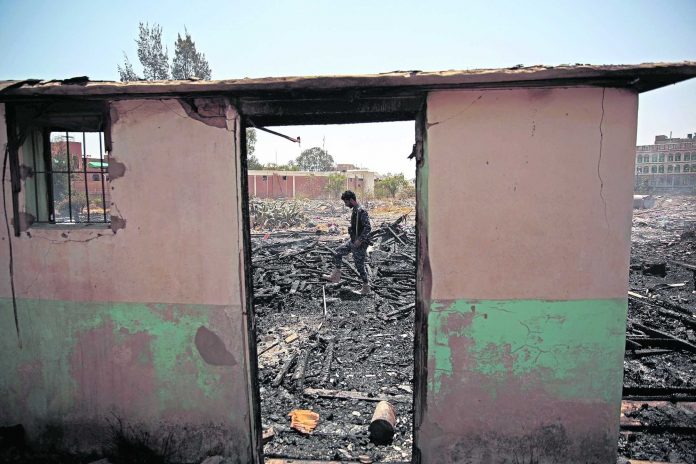
By ELLEN KNICKMEYER
Associated Press
WASHINGTON (AP) — The Pentagon and the State Department failed to investigate whether a Saudi-led coalition used arms or other materiel bought from U.S. suppliers in attacks alleged to have killed civilians in Yemen, a U.S. government report released Wednesday says.
The findings may undermine the reliability of assurances from a series of U.S. administrations that Americans were working to minimize civilian harm from strikes by two major strategic partners and arms-buyers, Saudi Arabia and the United Arab Emirates, in a now 7-year war against Iranian-allied rebels in Yemen.
Publication of the critical report comes the day after the White House confirmed that President Joe Biden plans a July trip to Saudi Arabia in a bid to bolster relations with the oil-producing kingdom. Biden took office denouncing Saudi Arabia over civilian deaths in Yemen and the 2018 killing of U.S.-based journalist Jamal Khashoggi.
Biden, a Democrat, also pledged at the outset of his term that the United States would withhold any U.S. offensive military aid to Saudi Arabia, in response to the bogged-down Saudi-led war in Yemen.
News organizations and rights groups have cited repeated civilian deaths blamed on airstrikes by the coalition. That includes a 2018 strike on a school bus that killed at least 26 children, according to Human Rights Watch, and other airstrikes have been reported on wedding parties and other civilian targets. The U.S. says it has worked to train Saudi forces on improved targeting and other best practices to minimize civilian casualties.
The United Nations estimates that from March 2015 to August 2021 about 23,000 airstrikes by the Saudi-led coalition in Yemen killed or injured more than 18,000 civilians. Under U.S., U.N. and other international mediation, all sides in the conflict have joined in what U.S. officials say is a promising truce this spring and summer.
Houthi rebels are also widely accused of rights violations, including forcing children to fight and profiting off food and fuel desperately needed by civilians. Yemen is the poorest country by far on the Arab peninsula. Aid groups and international organizations say the war has greatly deepened food insecurity for millions of people there.
The General Accounting Office examined how well the U.S. government has tracked any role that extensive U.S. military aid to its two Gulf strategic partners, Saudi Arabia and the United Arab Emirates, played in civilian deaths.
Congress commissioned Wednesday’s report from the GAO last year. The GAO is meant to be an independent watchdog assisting government oversight. The version of the report released Wednesday withholds what the government says is classified material from the original version, which was not made public.
The U.S. has provided more than $54 billion in military support to Saudi Arabia and the UAE since 2015, when Saudi-led troops launched attacks, through 2021. State Department officials told the GAO investigators they consider civilian harm and how equipment is used when weighing U.S. arms sales to Saudi Arabia, the report said.
“In addition, (Department of Defense) and State officials said they have made some efforts to understand the extent to which U.S.-origin defense articles were used in Yemen,” the report said.
“However, despite several reports that airstrikes and other attacks by Saudi Arabia and UAE have caused extensive civilian harm in Yemen, DOD has not reported and State could not provide evidence that it investigated any incidents of potential unauthorized use of equipment transferred to Saudi Arabia or UAE,” GAO investigators said.
In a written response to GAO investigators, State Department comptroller Jeffrey Mounts disputed the GAO’s overall conclusion. Mounts wrote that the State Department had provided documentation of government oversight of potential U.S. arms’ involvement in attacks that claimed civilian lives or hit civilian infrastructure.
GAO investigators said the documents provided by the State Department did not change their conclusion, however.
The report also quoted officials with the U.S. military’s Central Command saying “they do not know how DOD security cooperation officials in Saudi Arabia and UAE would obtain the information necessary to determine whether U.S.-origin defense articles were used in Yemen by Saudi Arabia or UAE against anything other than legitimate military” targets.
















